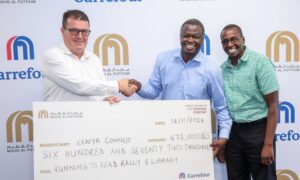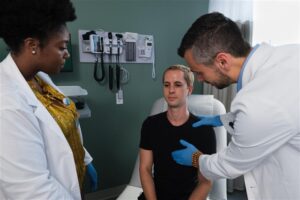Young Farmer Who Started-Out With Market Rejection; Today He’s Reaping Big Returns
When we were young, our teachers and relatives would often ask us “What would you like to become when you grow up?”
And we would answer heartily: “A pilot” “A teacher” “The President” “A rocket scientist” or something similar to that.
But times have really changed, and those so-called “big professions” are no longer the in thing.
Larry Keya is a young man who seems to have figured out this already.
He decided to become a farmer and an online tutor right after graduating from campus. We recently caught up with Mr. Larry in his farm in Eldoret and managed to grab a few jewels of wisdom from him.
Though promising, farming is a journey full of roses and thorns. When you start the walk, you have high hopes and expectations but along the way you realize without creativity and grit, nothing good may come out of it.
Like for most farmers, that is the story of Larry Keya a graduate of Agriculture Economics from Moi University who ventured into cucumber farming with gusto but got a baptism by fire before he broke even.
Things seemed to be working well for Keya when he made a first attempt at cucumber farming in 2012 at his farm in Kapseret, Uasin Gishu County.
He did his homework well and bought the seeds, prepared the land and planted the crops. Being a fast maturing crop, they were ready for harvest in less than three months.
“Lucky for me, the crops did well and were not attacked by any pests. I think what also helped was the fact that I grew them in a greenhouse. I harvested 500kgs of cucumber that I assumed would fetch good money,” Keya said.
But the joy of a bumper harvest was short-lived because he encountered a major setback at the market.
“The traders at Eldoret Main Market said the cucumbers were fine but were coiled thus not ideal for selling. I was really disappointed.
“I had to go back with them after several attempts to sell them failed. Because of the high perishability, within a few weeks, they were all rotten,” Keya said.
That was a big loss for him given that he had secured a Sh.150,000 loan from the government’s Youth Fund Enterprise programme to finance the project and was worried he would lose the collateral.
With such a depressing scenario, he had to think fast. After making some inquiries and researching online, an idea came to him on value addition.
“After extensive research I discovered that cucumber could be used to make juice just like watermelon. I bought a blender for the job,” he explains.
He began blending cucumbers and watermelons for juice but at first, they were not well received in the market. Keya had to think outside the box. And that is how the idea to make popsicles, popularly known as ice pops, came to mind.
The new products were accepted well in the local market within a short time. What boosted his sales was the fact that he launched the business during a hot season.
Slowly, with his savings from his ice pops business, Keya bought an efficient ice pop making machine at Sh.120,000 to boost his output to match the growing demand.
“The machine was a game changer because it made work easier. I used to extract juice from the cucumbers and watermelon, make a syrup, put some additives and freeze them on sticks,” he says.
With the machine, he would make at least 700 pieces of ice pops a day which he sold to vendors at Sh.5 each.
Selling at least 500 pieces a day, Keya would make Sh.2,500 with a profit margin of 60 per cent from total sales.
As the business grew, he taught his wife how to make them so that he could get time to tend to greenhouses and ensure sustained production of cucumber and melons, the raw materials for the business.
With time, he says demand for the popsicles increased prompting him to buy a bigger machine at a cost of Sh.380,000. This one makes 7,800 pieces of ice pops in under 24 hours.
“The machine added more value as it would mold the ice pops in fancy shapes that consumers loved. My sales increased and I could also make bigger ice pops that we sold at Sh.7 per piece. With an average sale of 900 pieces daily, my income was Sh.6,300 per day,” he said.
With over 20 vendors and the rising demand, Keya started making yoghurt on a stick, using the same procedure for cucumber and watermelon ice pops. He sells these at Sh.20 per piece.
He got certification and approval from Kenya Bureau of Standards and his Sweet De Laat Food and Drink Company distributes cucumber, mango and milk-based popsicles in Uasin Gishu, Kakamega, Trans Nzoia, Nandi and Turkana counties.
“Opportunities are always available. You just have to be open-minded enough to look and see them. Farming in itself presents one of the best opportunity to create income because everyone everyday must eat. The Key is starting small with patience and persistence” says Larry Keya
*Finally*
I hope Larry Keya`s success story has been an inspiration and enlightenment to you.
Farming can be a profitable business, if you understand it to be a “business”.
The first problem we have about encouraging Kenyans to embrace farming is that, most people see agriculture as a dirty thing.
How did we arrive at this mindset?
Because our forefathers were subsistence farmers, they were poor and dirty. This has made us to have a wrong conclusion about the whole concept of farming.
The good news is, farming can be a source of wealth for you. There are now many commercial farmers who are wealthy.
Even now that “good jobs” are dead, most people are still ignorant of the potential in agribusiness
We need an urgent re-orientation!
We have to start seeing farming as business and blood of our nation.
Timothy Angwenyi
Business Consultant
Justine Nyachieo
Business Man & Mentor








